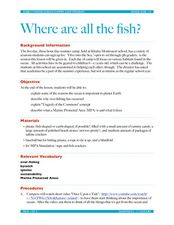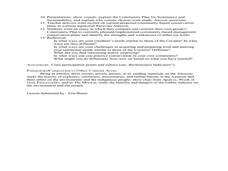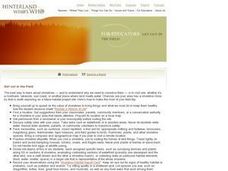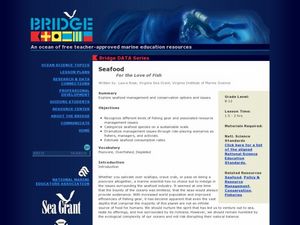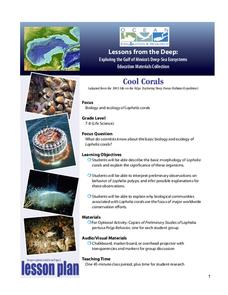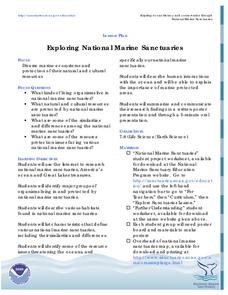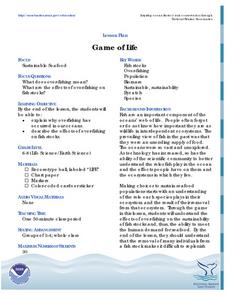Curated OER
'O'opu Life Cycle
Young scholars investigate the life cycle of the 'o'opu also known as Hawaiian gobies. In this amphidromous living lesson, students discuss the reproductive cycle, create props and an obstacle course to demonstrate the importance...
Curated OER
Where Are All the Fish?
Young scholars identify the problems that marine life is facing today. In this marine science instructional activity, students explain how Marine Protected Areas can help the ocean and the fish. They brainstorm ways to help in the...
Curated OER
Supermarkets, Sustenance and Sustainability
Students investigate jungles and the people who depend upon them. In this sustainability instructional activity, students research wild life conservation and discover the importance of a jungle to Amazonian people. Students...
Curated OER
Fisheries And Songs
High schoolers view examples of songs that have the ocean and its life as their themes. After hearing and reading them, students write their own, having done research on the social and political issues of the ocean's environment.
Curated OER
Altimetry
Fifth graders accurately measure the distance to eight points on an uneven surface by conducting a simulation of sattelite altimetry. They create a two-dimensional model of the simulated ocean surface by graphing data from the Radar Run...
Curated OER
Earth Water Distribution and Water Consumption
Young scholars explore the need for conserving fresh water and understand that it is a limited supply. In this water consumption lesson students participate in an activity and answer questions.
Curated OER
Get Out in the Field
Pupils visit a shoreline--of an ocean, a lake, a pond, a riverbank, etc., survey it and record what they find there. They map the shoreline and surrounding area and conclude where potential waterfront projects could occur.
Curated OER
Water World
Students explore the various steps of the water cycle. They identify the three steps in the water cycle and how they are related. Students describe three ways to conserve water. Students explore the origin of the water source that...
Curated OER
Seafood: For the Love of Fish
Students role play a scenario specific to decision making in seafood management and conservation. In this marine science lesson, students estimate seafood consumption in their state. They recommend new regulations for better fishery...
Curated OER
A Guided Journey Into the Past
Fourth graders use guided imagery to discover and judge an alternative way to enjoy artifacts without removing them from archaeological sites.
Curated OER
Food Web
Students are able to define food web, and identify the interdependence of organisms within a system. They are able to describe how natural events and human activities can impact a food web.
Curated OER
GLOBAL WARMING
Students form definitions of the greenhouse effect based on prior knowledge, class discussion, viewing diagrams, and participate in group brainstorming sessions and class discussions related to the impact of the greenhouse effect and...
Curated OER
What Are The Properties of Sea Water?
Ninth graders conduct research on the subject of sea water. They use a variety of resources to obtain information. There are helpful resource links listed in the lesson. In conjunction with the research students make inquiry of the...
Curated OER
Map-A-Buddy
Students investigate the concept of tracking and spatial movements of animals in relation to the environment in which they live. They participate in an interactive activity by tracking one another over a pre-defined region, record the...
Curated OER
Coral Snapshots
Using photographs and a coral reef identification key, junior marine biologists compare changes in coral cover for a No-Take Area and the surrounding unprotected area. The data that is collected is then analyzed for richness,...
Curated OER
Turning the Tide on Trash: Marine Debris Curriculum
Six different lessons comprise this unit on marine debris. Science, language arts, social studies, and art projects make this an ideal interdisciplinary unit. The result will be well-informed future citizens who can help make a...
NOAA
Deep-Sea Ecosystems – Cool Corals
Young oceanographers research deep sea corals that thrive on chemosynthesis. The lesson plan focuses on the biology of the animal, preferred habitat, associations, and interactions.
Curated OER
Empty Oceans
In groups of four, pupils brainstorm about seafood. They view the Monterey Bay Aquarium Seafood Watch website to examine the problems caused by the seafood industry. Learners are then brought back together to discuss what they...
Curated OER
March of the Polar Bears: Global Change, Sea Ice, and Wildlife Migration
Students study global change and how these changes impact wildlife. In this polar bears lesson plan students analyze maps and data to understand climate change.
Curated OER
Marine Debris
Students perform experiments to examine if debris float, or blow in the wind. The effects of these characteristics on the marine debris are then discussed. They determine how a material can influence what becomes marine debris.
Curated OER
Caught in a Net
Young scholars read and discuss the bycatch of the sea and the economic impact of taking bycatch away. In this bycatch lesson plan, students discuss the rights of fisherman and observe pictures of sea animals.
Curated OER
SPLASH – Monitoring Humpback Whales
Students view a video about the humpback whale and why it is endangered. In this endangered species lesson, students recognize the importance of observing and following an endangered species in an ecosystem. Students identify the animals...
Curated OER
Exploring National Marine Sanctuaries
Learners research marine ecosystems by creating class presentations. In this oceanography instructional activity, students research the different locations of marine sanctuaries by identifying them on a transparency map in class....
Curated OER
Game of Life
By playing this game, students discover what happens to a fish stock when large amounts disappear.

